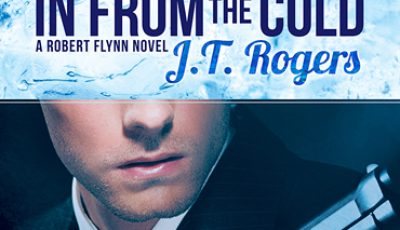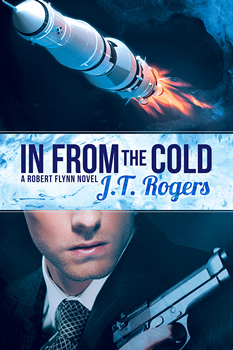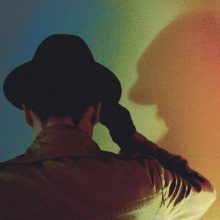

In From the Cold by J.T. Rogers
 Robert Flynn abandoned a sterling military career when his best friend and fellow soldier, Wesley Pike, died under his command. More than a decade later, Flynn’s quiet life is disturbed by the troubles of a fledgling CIA and Alexander Grant, a flashy agent with a lot to prove.
Robert Flynn abandoned a sterling military career when his best friend and fellow soldier, Wesley Pike, died under his command. More than a decade later, Flynn’s quiet life is disturbed by the troubles of a fledgling CIA and Alexander Grant, a flashy agent with a lot to prove.
As the space race between the United States and the Soviet Union heats up and the body count rises, the two men fight to find common ground. Grant knows Flynn believes in the cause, but all Flynn sees is the opportunity to fail someone like he failed Wes.
An attack by a Soviet agent spurs Flynn to action and a reluctant association with the agency, and tilts Flynn’s world on its axis with a shocking discovery: Wesley Pike may be alive and operating as a Soviet assassin.
Author J.T Rogers took time out of her busy schedule to discuss IN FROM THE COLD with The Big Thrill:
How does this book make a contribution to the genre?
Set in a world very much like our own, IN FROM THE COLD walks between the raindrops of real history. In conducting research for the novel, I was constantly surprised and delighted by the diversity of the men and women who served in the intelligence community. COLD therefore seeks to play with and deconstruct the James Bond model of spy, and offers up an alternative to his brand of stoic, ironical detachment. The characters in my novel feel—deeply so—and the personal stakes are as important to the plot as the global ones.
Was there anything new you discovered, or surprised you, as you wrote this book?
Flynn’s relationships, romantic and otherwise, ground IN FROM THE COLD. I think the thing that most surprised me in my research was how being gay was treated as something of an open secret within the global wartime intelligence community—Guy Burgess certainly comes to mind. The 1950s ushered in new policies to crack down on “unwanted” behaviors, but I found the difference between the cultural perception of espionage as this hyper masculine and heterosexual pursuit versus the more complicated and nuanced reality absolutely fascinating. In writing COLD, I wanted to create a universe that better reflected the messiness of the real world.
What authors or books have influenced your career as a writer, and why?
I think it’s safe to say that I’m influenced by the pulp writers: your Flemings, your Chandlers, and your Hammetts, though if I had to pick a more modern writer, Ed Brubaker is undoubtedly at the top of my list. I’d also have to put J.K. Rowling on there, for her ability to introduce a character and, within the space of a paragraph, make them feel like an old friend. In the editing process, I had to fight hard for what I termed, affectionately, as my Discworld moment, so Terry Pratchett must be counted as well. I also tend to read a lot of nonfiction, and writers like Ben Macintyre have a way of presenting complex information in interesting ways that I find invaluable as a lesson in delivering exposition to the reader.
*****
“Masterfully written as if the reader is a trusted and weathered fellow member of the Devil’s Brigade, IN FROM THE COLD is an engaging spy thriller of nail-biting action sequences layered with emotionally honest storytelling. The framework of Lt. Col. Robert Flynn’s efforts to save and reunite his Brigade almost a decade after the end of WWII cleverly underpins the beautiful and tragic love story that only a conservative military in an equally conservative era can silence. For those who wish to read a captivating story of identity, love, duty, and camaraderie in one of U.S. history’s most intriguing eras, IN FROM THE COLD is your novel.”
~K. Perkins, DC Comics’ SUPERGIRL (36-40)
*****
 J.T. Rogers grew up wanting to be either a superhero or a spy—but rather than pick one over the other, she chose to become a writer instead so she could be both in her spare time. Her fiction reflects her childhood obsessions, blending together the distrustful, cloak-and-dagger world of spies with the high-octane action and camaraderie of her favorite superheroes.
J.T. Rogers grew up wanting to be either a superhero or a spy—but rather than pick one over the other, she chose to become a writer instead so she could be both in her spare time. Her fiction reflects her childhood obsessions, blending together the distrustful, cloak-and-dagger world of spies with the high-octane action and camaraderie of her favorite superheroes.
The product of a bilingual education and an alumna of a handful of universities, J.T.’s passions include history, comic books, and Shakespeare. She has lived all over North America and loves to weave threads of authentic local color into her stories. Just ask her about Lucy the Elephant.
Currently, she’s living the dream of being overworked and underpaid. She writes to stay sane—or that’s the story she likes to tell, at least.
To learn more about J.T. Rogers, please visit her website.
- Africa Scene: Iris Mwanza by Michael Sears - December 16, 2024
- Late Checkout by Alan Orloff (VIDEO) - December 11, 2024
- Jack Stewart with Millie Naylor Hast (VIDEO) - December 11, 2024
